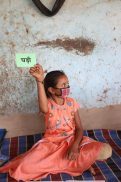Covid-19 Update
Faced with lower-than-average vaccination rates in Udaipur district (63.9% compared with 78.3% across Rajasthan as a whole for those aged 45+) and desperately low rates in the poorest tribal areas (as low as 6% in the poorest, most remote area in which the NGO works), Seva Mandir launched its Hum Sajag campaign. The name means ‘we are alert, prepared and ready’, and the campaign was a multi-pronged communication strategy focusing on three key aspects: building watch committees, training frontline staff in the use of technical tools and utilising local folk media, including ritualistic dance and street theatre, to combat vaccine hesitancy. The watch committees, consisting of community members, Seva Mandir staff and other frontline workers, act as eyes and ears in the villages, working to understand the myths surrounding the virus and combat challenges presented by the lack of reliable information.
Designed using songs, dance and drama performed in the local languages, the theatre production was a creative solution devised by Seva Mandir to increase awareness and reduce vaccine scepticism. The narrative of the play was designed to be engaging and relatable to its audience, drawing on the existing caste and gender hierarchies in the villages and encouraging the audience to ask questions in the middle of the act. After the show, the local leaders and frontline workers told the audience where to find the nearest vaccination camps and answered questions.
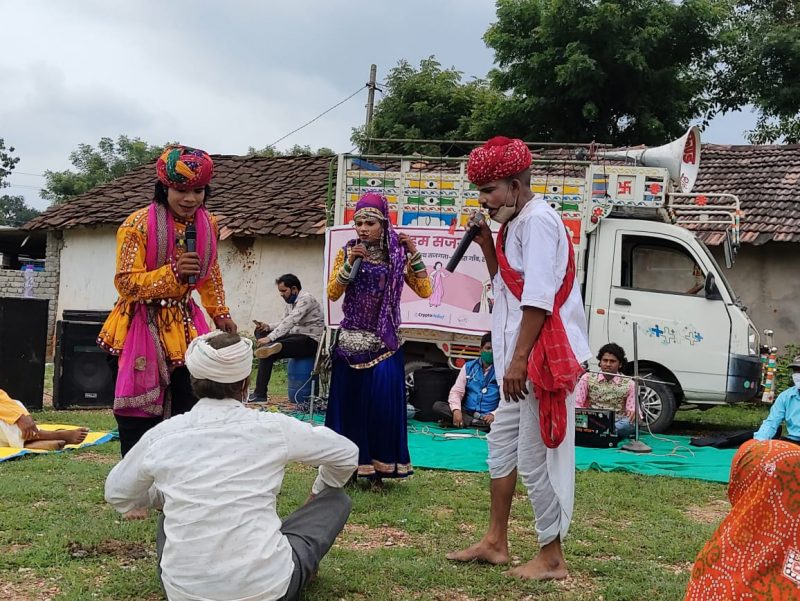
In the last few months, Seva Mandir has helped set up 1,555 Covid-19 management bodies in the communities, and more than 14,000 people have been persuaded by institution leaders to get vaccinated. In this way, Seva Mandir has been able to support the government in boosting vaccination in the most remote villages of southern Rajasthan. More than 5,500 frontline workers are now equipped with safety and diagnostic kits, which include masks, sanitisers, oximeters and thermometers. Five community and primary health centres now have a diesel generator, which will help provide a steady electricity supply.
Seva Mandir’s Covid-19 campaign has helped strengthen partnerships within the rural health ecosystem, especially with frontline health workers and across all areas of administration. Through integrating awareness and relief efforts with intensive vaccination drives, Seva Mandir has been able to build community preparedness and mobilise people for vaccination.
Impacts of Covid-19 on Children and Young People
The impacts of Covid-19’s most recent wave have been felt acutely by rural communities in southern Rajasthan, not least by its most vulnerable groups. This newsletter will draw attention to the numerous and pronounced ways in which Covid-19 has affected the lives of children and young people and how Seva Mandir has been helping. We will focus in particular on education, engaging young people through sport, gender sensitisation and malnutrition.
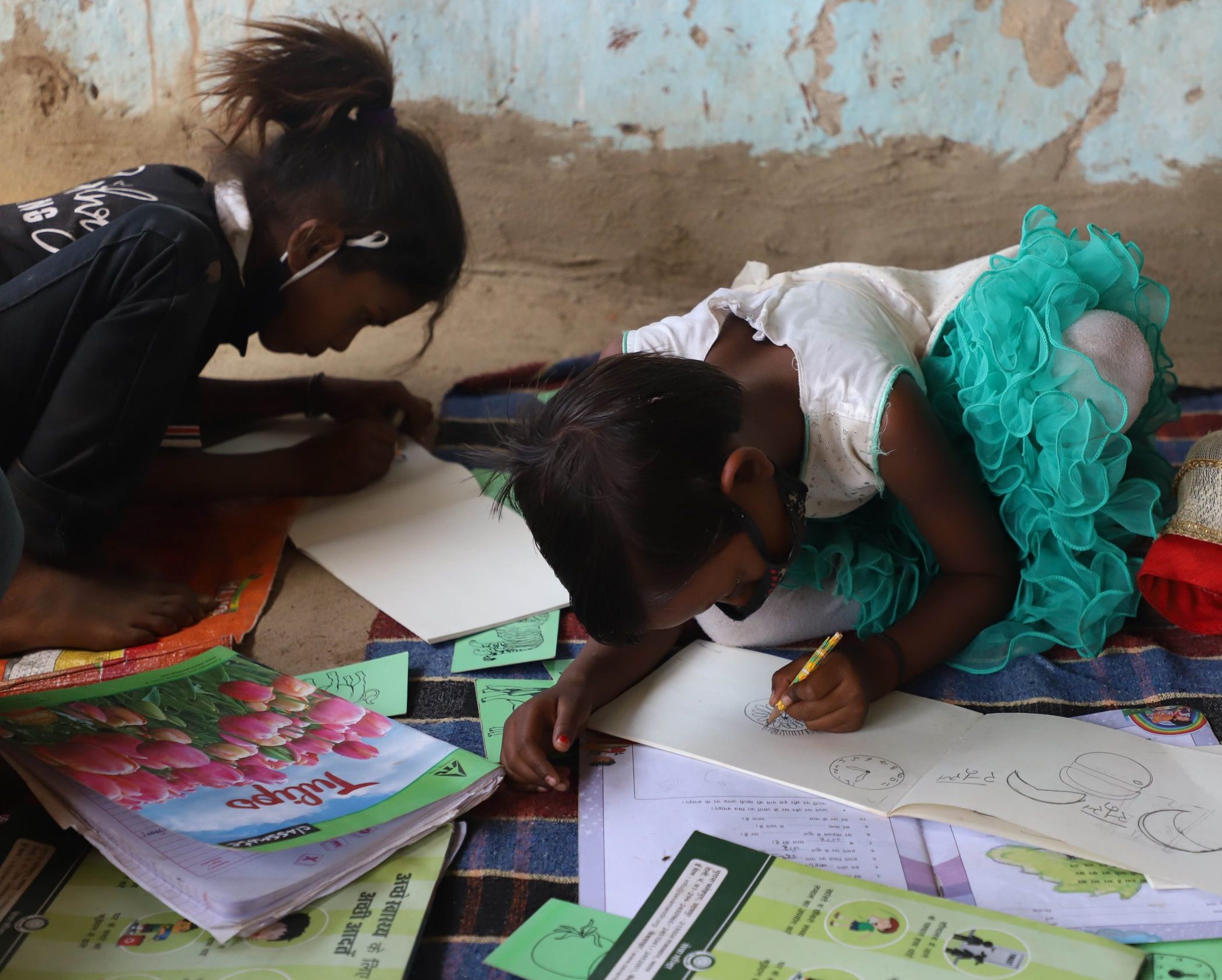
Education
The education of children and young people has taken a significant hit. To address the pressing need for support in this area, action has been taken by Seva Madir to provide additional teachers in government schools, supply study provisions to children in desperate need of learning resources and support the livelihoods of the families of children attending learning camps, which offer education to children who have missed out on schooling as a result of poverty.
‘[My daughter] missed out on her education at the time as we did not have anything for her to read or write!’ [1]
Seva Mandir conducted surveys to understand the on-the-ground situation and educational needs post the second wave. They identified that children have suffered considerably and feel demotivated by the lack of basic educational amenities available to them due to the economic constraints of their parents. The great danger that follows from this feeling of demotivation is that if children drop out of school as a result, they are almost always lost to education forever. Lockdowns meant that many parents had children at home, only adding to their economic strains. During this period, many parents relied on their children for help around the home and out in the fields:
‘As a homemaker, work increased tremendously. I did have help from my child, but I cannot forget that my child had to forgo his daily life… My daughter bore the brunt of everyone being at home. She helped with all the housework, including bringing firewood and gathering fodder for the domesticated animals.’ [2]
Even since it has become possible to reintroduce learning in schools, many parents require convincing to allow their children to take part in lessons again. Many were hesitant to encourage their children to participate when school teachers came out to visit them and delivered lessons outside the home during lockdown. It is now imperative that parents are convinced of the worth of sending their children back to school. In an effort to tackle this issue, Seva Mandir has distributed vital technology, including smartphones and portable Bluetooth speakers, to reconnect children to crucial learning aids.
‘We anticipate high rates of dropouts and are sparing no effort to avoid that. In this village, online classes have not been possible as most people do not have a smartphone.’ [3]
This provision is a significant aid to children and young people, the majority of whom come from households that share one basic phone, meaning there is limited (if any) opportunity to use it for learning purposes. The team have also provided useful educational supplies such as school bags, worksheets and necessary stationery.
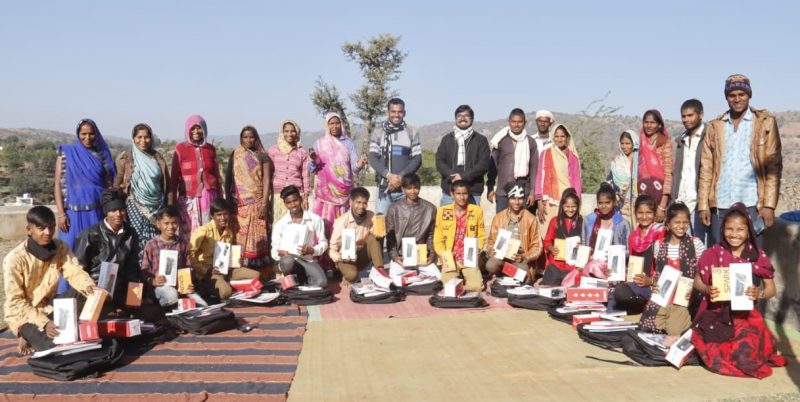
Resource Rooms in government schools:
In the wake of Covid-19 lockdowns, educational institutions around the world have faced a singular challenge – not only must they work to fill in the gaps at critical stages of learning, but they must also learn how to recapture the imagination of children and young people who have become disengaged as a direct consequence of time spent away from school. One of the ways that Seva Mandir is addressing this issue is through Resource Rooms in government schools. Rural government schools are often far from tribal communities and, even when reachable, are often under-resourced, under-funded or, in some cases, closed. Seva Mandir works extensively to collaborate with these schools with the aim of helping to improve the quality of education they deliver.
Resource Rooms are helping more than 3,500 children rediscover the joy and excitement inherent in early learning and, as a result, reduce the rate of dropouts. Built within the government school premises, these specially equipped rooms contain a range of interactive resources to inspire curiosity and encourage peer learning. All Resource Rooms are stocked with STEM (science, technology, engineering and maths) learning books in both English and Hindi, art supplies and a range of digital learning solutions. Many children who are joining school for the first time due to lockdowns are hugely benefiting from these spaces, which are proving not only an aid to learning but to the overall happiness of pupils.
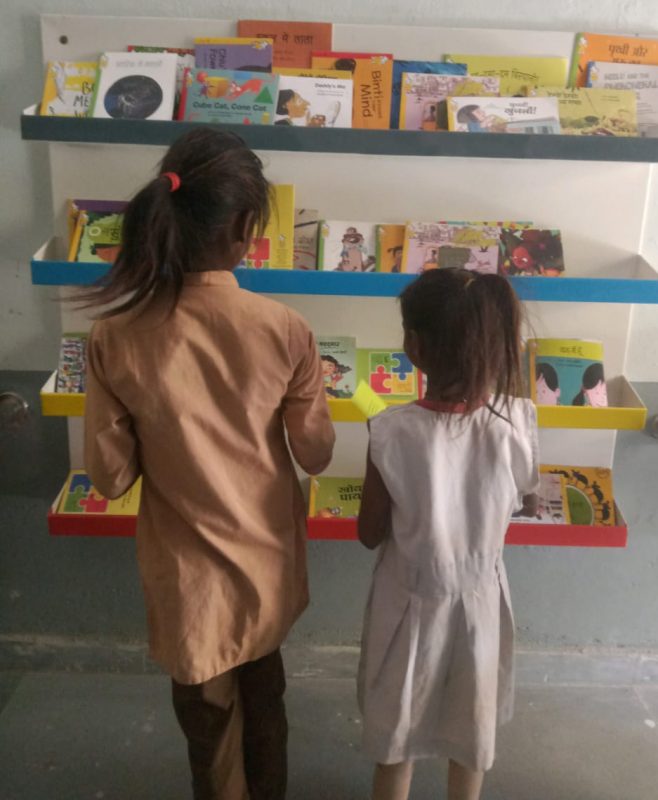
‘Children love playing with different learning materials. The excitement is very motivating.’
-Poonam, a teacher provided by Seva Mandir to run Resource Rooms
Tools to develop literacy and mathematics skills:
Displayed on multi-level library shelving, Resource Rooms contain 100 carefully curated fiction and non-fiction books – with something to suit all literacy levels. The language-based teaching/learning materials available allow pupils to practise various components of language through games, making it easier for learners to grasp concepts quickly. There are maths kits for primary grades, which allow teachers to demonstrate mathematical concepts interactively and enable children to incorporate a sensory element into their learning process.
Artistic resources to inspire creativity:
Artistic displays give the Resource Rooms a distinctive appeal and aid the teaching-learning process. While some pieces of artwork demonstrate concepts, such as time and space, other pieces serve as tools for initiating dialogue and disseminating information. The art helps stir the innate curiosity of young learners while creating avenues for story-building.
Digital learning aids:
The digital learning resources available help contribute to an inspiring multi-stimulus learning environment for children. Rooms are equipped with a state-of-the-art projector and computer tool, pre-loaded with learning materials for all subjects and a range of grades in both Hindi and English. The device produces a high-quality image, and powerful sound ensures that the lesson is heard throughout the room. The projector can also transform any surface into a writing board, making it very useful for under-resourced schools.
Furnished for learning:
Resource Rooms are well-designed spaces with library shelves, a media rack and trapezoid benches. These benches can be rearranged into different shapes, transforming the learning space according to the nature and need of the activity. There are storage spaces available to help to protect pupils’ belongings and to free up floor space for teaching-learning activities. The media rack stores the projector device safely and allows it to be portable.
Not only are Resource Rooms addressing an immediate issue created by the pandemic, but they are also a hugely positive step towards improving the rural education ecosystem on a long-term basis.
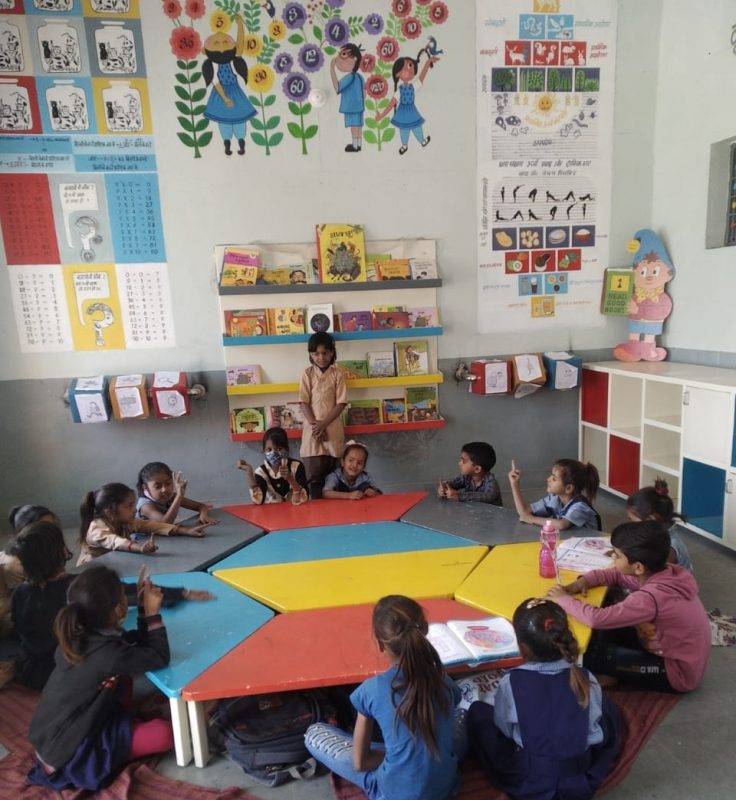
Engaging Young People through Sport
After being temporarily halted due to Covid-19, Seva Mandir has now resumed the ‘Sports for Change through Football’ initiative, which is supported by the FIFA Foundation. This year over 180 young boys and girls will learn a variety of skills through the medium of team sport. Girls have benefited especially so far, and we hope to see this continue as the initiative is reintroduced. As well as developing young people’s sporting skills, the training offered has helped build self-confidence, trust and team building.
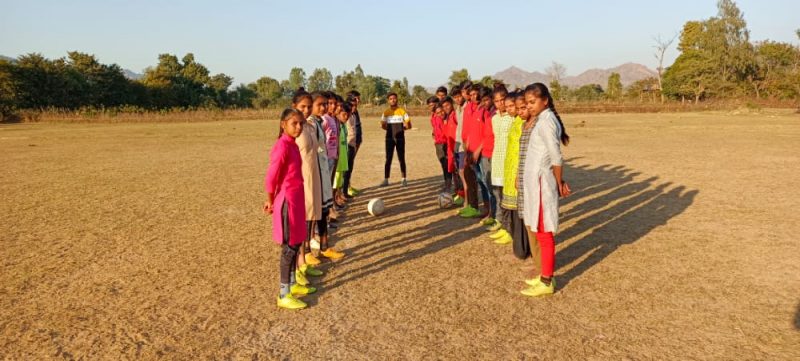
‘I am so happy to be out and able to play with so many other children of the village.’
-Reshma, a 12-year-old from Jhadol
The sports programme has proved a successful tool in bringing together young people across the boundaries of caste and religion, fostering more cohesive communities. Once young people are engaged, they are encouraged to participate in training and discussion around important issues such as gender and sexual health.
Gender Sensitisation
A devasting impact of Covid-19 was the alarming increase in violence towards women and young girls across the globe. As the teams at Seva Mandir continue their work to build better spaces to help empower women and young girls facing oppression, they have also begun to consciously build dialogues with boys and men around this topic. The teams have started to engage more boys and young men across all of Seva Mandir’s work areas in an attempt to dismantle ingrained patriarchal biases through conversation.
During a discussion around the gendered division of domestic labour, one young boy named Ramesh shared:
‘I feel ashamed when I do women’s work like cooking and cleaning. It feels weird because women in my family [don’t] ask me to do it, nor does anyone around me do it. I have started questioning [why that is] now.’
Another young boy attending the campaign against violence shared:
‘I understood physical beating up as violence quite clearly. But it struck me that verbal abuse and the fear that girls live in is also abuse!’
Through activity-based sessions, movies and participatory dialogue, Seva Mandir’s facilitators are helping to build champions of gender equality at the grassroots. The initiative has opened new avenues of expression for boys and young men, enabling discussions around gendered power dynamics and the pressure put on men to ‘perform’ in society.
Malnutrition
Another of the dangerous effects of the pandemic relates to the prevalence and severity of malnutrition in the area, particularly in young children. Already an existing problem, malnutrition has not only increased in severity, but improvements made thus far have been at risk of being undone. In response to this, there has been a significant intervention from Seva Mandir in the form of nutrition gardens and a drive towards holistic education for families around nutritional needs. The pandemic has also brought about an unprecedented need for Seva Mandir’s CMAM (Community-based Management of Acute Malnutrition) camps, which deliver community-based healthcare to malnourished children. These camps are a lifeline to families in rural communities, many of whom face significant difficulties in accessing government-run medical treatment centres.
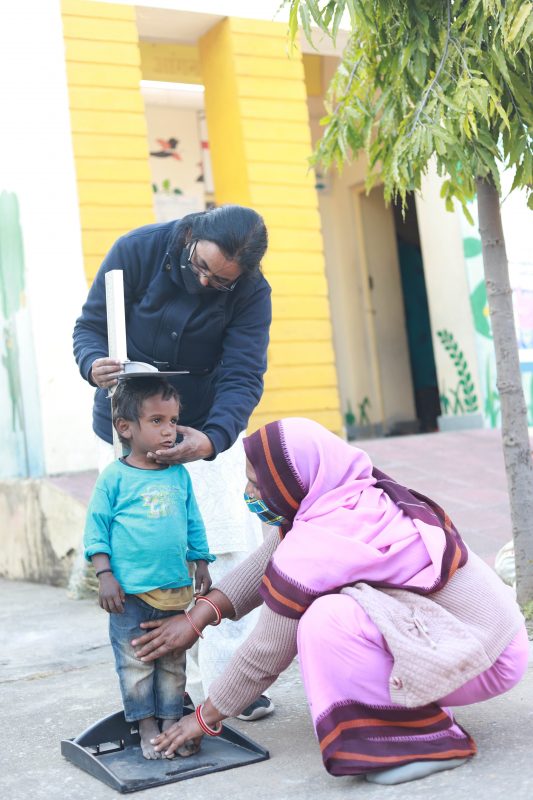
CMAM camps:
Infancy and early childhood are a time of rapid growth and nutritional vulnerability for children, and the first two years of life are especially crucial. Covid-19 has severely impacted these years for many children in southern Rajasthan. Families have encountered significant obstacles such as increases in food prices, unemployment, limited mobility, the closure of Anganwadi centres (government-run childcare centres that distribute government rations to mothers of young children) and disruptions to health and social services. As a result, children’s nutritional intake and overall health have suffered.
Seva Mandir’s efforts to help communities fight malnutrition in young children focus on building strong community-based education and support programmes in the most remote villages of southern Rajasthan. This year, the teams have screened more than 90,000 children to identify their status of malnutrition. More than 11,000 children were reported as either severely or moderately malnourished. Seva Mandir’s CMAM camps are crucial at this time, providing the most severely malnourished children with treatment and offering nutrition advice to mothers.
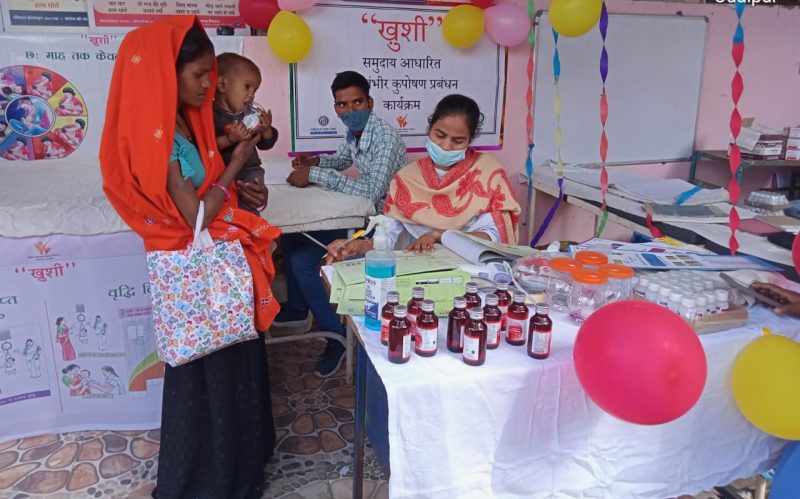
Nutrition Gardens:
As part of their home-based care, Seva Mandir has trained a team of Balsakhis (translated literally as ‘children’s friends’). Balsakhis serve as community health workers, visiting homes to provide neonatal and infant care and advice. The team encourages families to grow nutrition-rich vegetables and shows them how to incorporate these foods into their diets. The Balsakhis create healthy dishes and demonstrate the recipes to mothers, teaching them healthy cooking techniques and discussing the importance of hygiene in cooking. Nutrition gardens are strengthening resilience and helping families to eat healthily throughout the year. So far, more than 10,000 families have received seeds as well as support to plant kitchen gardens. In addition to directly contributing to the health of families, these gardens also help decrease expenditure on vegetables, meaning that mothers can save money for other costs of living.
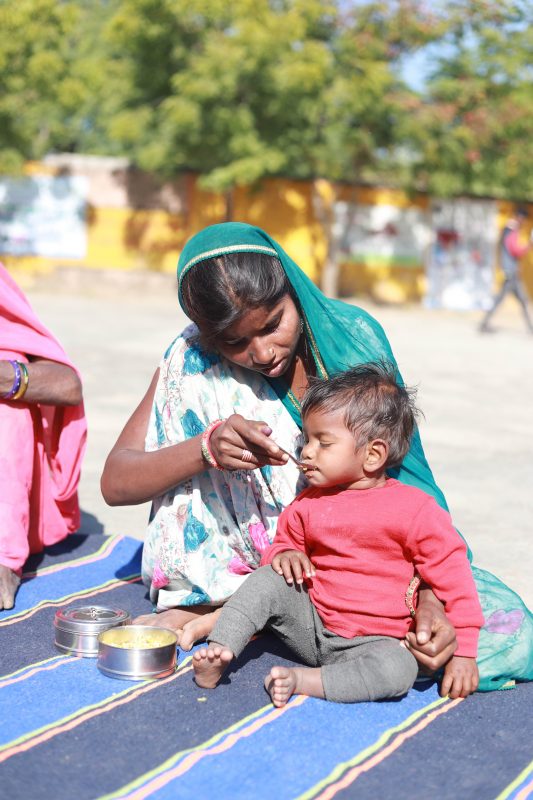
Can you help Seva Mandir support the health and education of children and young people whose lives continue to be affected by the pandemic?
If you would like to help Seva Mandir continue their vital work in this area, please donate here.
[1]Jahnavi Mukundan, Preeti Shaktawat, Alka Sharma, Yashaswi Dwivedi, “Impact of the COVID-19 Pandemic on the Lives of Children in Tribal Rural Communities of Rajasthan: III. Narratives”, Children First 1 no. 1 (October 2021): 105.
[2] Mukundan, Shaktawat, Sharma and Dwivedi, “Impact of the COVID-19 Pandemic”, 105.
[3] Mukundan, Shaktawat, Sharma and Dwivedi, “Impact of the COVID-19 Pandemic”, 105.

